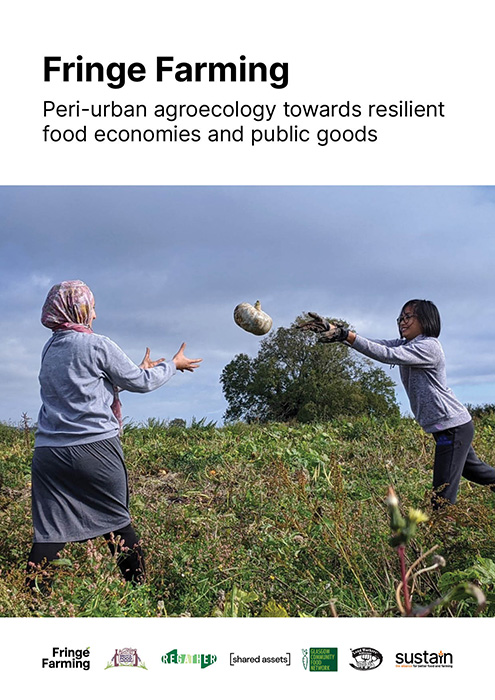Fringe Farming: peri-urban agroecology towards resilient food economies and public goods
Local and national policy recommendations to support agroecological farming producing multiple benefits at the edge of UK cities. Based on research and action planning with multiple stakeholders in four city regions, national farmer forums and policy focus groups.
Agroecological farming is an approach where food is produced by working with nature, rather than against it, and is traded fairly through closer relationships between producer, trader and consumer covering seed to soil to plate. This systemic approach creates multiple social, economic and ecological benefits in peri-urban areas including:
- Increased access to regionally-produced, nutritious, culturally-appropriate foods
- Generation of goods and services that support community wealth-building
- Provision of jobs and training in a regional economy
- Access to green space and outdoor learning at the edge of built-up cities
- Support for community development through community-owned resources, events, and volunteering
- Sequestration of carbon through farming approaches that work with natural cycles in effect creating ‘carbon-sinks’ surrounding urban space
- Increased biodiversity through companion planting and integration into agro-forestry
These multiple benefits and public goods can support local, regional, and national government to meet existing goals covering climate change, biodiversity, enterprise and employment and more. In terms of urban planning, agroecological farming on the fringes of cities can assist a green economic recovery by using farming methods that retain the ecological benefits of peri-urban areas and greenbelt land, while also building economies that connect the urban and the rural.
Desk based research in London, UK, estimated that the conversion of 1.4% of land growing cereals and grassland to vegetables around the city could produce an additional 1.3 million kg of food for communities. Considering the increase in both demand for regionally-produced foods, and demand for land by a new generation of growers, there is an opportunity for government, at different levels to meet these demands. For example, they could mobilise land, infrastructure and investment to support new green economies that channel funds to local communities. Some of the report recommendations are:
National Policy
- The 5-hectare eligibility criteria for farm support needs to be removed to enable access for peri-urban agroecological growers who produce numerous public goods. There should be no size, or other limit to peri-urban farm eligibility in any of the four nations’ schemes.
- Provision of start-up grants for new entrants, in assistance with capital costs and/or revenue support. This could be through blended finance (public and private loans and grants) as peri-urban agroecological farms are well placed to generate multiple streams of income once up and running. In England, this could be included in the soon to be launched New Entrants Scheme and via new public farm investment and technology funds.
- Government planning policy to prioritise safeguarding land for peri-urban agroecological farming that are Grade 1 and 2 soils, rather than used for other development and ensure planning policy does not inhibit peri-urban enterprise growth.
Local authority policy and actions
- All local authorities should have a food strategy and related policies that incorporate agroecological farming, recognising the benefits this will bring.
- Increase the amount of land and other physical spaces available for agroecological farming and make these available for new initiatives.
- Emphasise equitable opportunities and leadership in food and farming through all relevant strategies and actions to ensure access to land, infrastructure, routes to market and training are open and accessed by all.
- Ensure peri-urban agroecology is integrated into an economic strategy to help build community wealth and a greener, fairer, resilient economy.
More recommendations and details are in the report.

Fringe Farming: peri-urban agroecology towards resilient food economies and public goods
28pp - 2022 | 2738Kb
Published Monday 7 February 2022
Fringe Farming: The Fringe Farming project is a collaboration with partners across the UK to understand barriers, identify land opportunities and local actions, and develop national policy to enable agroecological farming at the edge of cities as part of a green economic recovery.